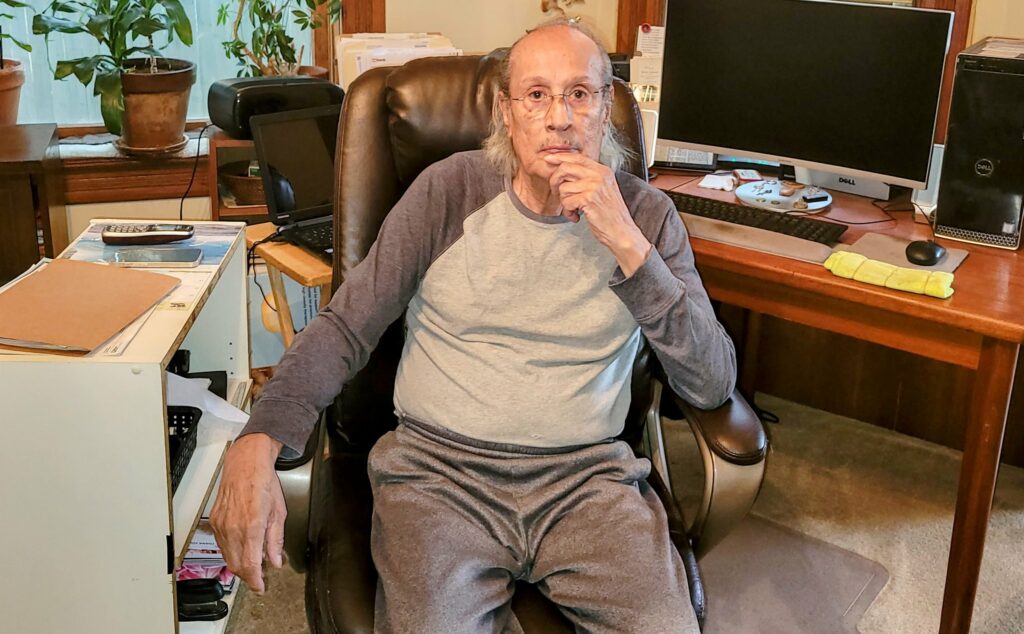Ernesto Chacon Will Be Honored For His Advocacy for Milwaukee’s Latino Community
UW-Milwaukee will honor civil rights leader.

Ernesto Chacon, 84, now spends his free time working on a book about his experiences. “A downside of being an organizer is that you’re never satisfied,” he says. “But we did our part in getting the resources to the community. Now it’s this generation’s job to protect them.” Photo by PrincessSafiya Byers/NNS.
Ernesto Chacon will be honored Friday by the University of Wisconsin-Milwaukee’s Roberto Hernández Center for his role in winning civil rights for Latinos in Milwaukee and at the university.
Chacon, 84, played a key part in the Latino community’s fight for change and justice in Wisconsin.
The Roberto Hernández Center provides Latino students at UWM with academic, financial aid and other services. Hernández, who died in 1994, was instrumental in getting such services to Latino students.
According to Maldonado, Chacon’s impact is still felt today.
He was a part of a series of protests against Milwaukee’s Allen-Bradley Co. to get the manufacturer, now owned by Rockwell Automation, to hire Black and Latino workers. He spent years rallying for welfare reform or advocating for Latino rights.
And in the years that followed, Chacon took on leadership roles in some of the groups and organizations that grew out of the protests.
He served as president of the Federation for Civic Action and worked as the deputy director of the Milwaukee office of former Wisconsin Gov. Jim Doyle.
Born in Pearsall, Texas, Chacon is the seventh of 12 children.
As a child, he joined the Catholic Youth Organization, for which he traveled with migrant farmworkers while they labored in the fields.
In his junior year of high school, he traveled to the Midwest with the migrant farmworkers who he had been studying.
Chacon said his job with the migrant workers involved writing letters back home for the workers, cleaning houses and picking up mail.
“The workers would talk about how much they loved their families and how much of the work they did were for them, and it made me feel like my family loved me like that even though they never said it directly,” he said.
While with the workers, Chacon got a firsthand look at injustice.
“I learned a lot about life, in terms of how people struggled to survive and what they had to do to support their families,” he said. “It was an interesting point for me because I didn’t understand why people had to travel so far to earn a living for their families, and from there, I began to see what I would do once I finished high school.”
Though not a migrant worker himself, Chacon worked with La Raza Unida, a former Hispanic political party, early in the Chicano movement. He also was involved with the Wisconsin part of the 1965 United Farm Workers grape boycott.
Right out of high school, he took a job with UMOS, the United Migrant Opportunities Services, in Milwaukee, working with migrant farm workers who were going through the state of Wisconsin.
Through his work, he met Jesús Salas, another key figure in the Chicano movement.
Also from Texas, Salas said he’d heard about Chacon before they met because Chacon was a high school athlete.
“In ’68-69, he (Chacon) joined our picket lines, and I was able to learn from him as an organizer,” Salas said. “He’s fully dedicated to his work and the community.”
In 1970, Chacon was arrested at a welfare rally after a scuffle with a police officer.
“It ended up being over a year-long thing before me and José (another organizer) were sentenced to six months in the house of corrections,” Chacon said. “Then those same people that I was marching with started protesting for my release.”
Chacon said he was eventually pardoned by the governor, under the stipulation that he would not be involved in any more demonstrations. He was pictured a few months later at a protest in the UWM chancellor’s office in Milwaukee.
Salas, who later served on the University of Wisconsin System Board of Regents, said one of Chacon’s biggest contributions was his ability to unite Latinos.
“Latinos are very diverse and don’t always get along,” Salas said. “But Chacon was intentional about uniting everyone and that has allowed us to move forward without the tensions you might see in other communities.”
“A lot of our work was with (Father) James Groppi and the commandos,” Chacon added. “After the Allen-Bradley marches, Latino people and Black people realized we had a lot of the same struggles and started working together more.”
Groppi was also a civil rights activist in Milwaukee.
Chacon said he is proud of the work he has done, but it doesn’t feel like enough.
“A downside of being an organizer is that you’re never satisfied,” he said. “But we did our part in getting the resources to the community. Now it’s this generation’s job to protect them.”
These days, Chacon is living a quieter life on Milwaukee’s South Side and is working on a book about his experiences.
“If I could do it all again, it’d be fewer marches and more seminars and workshops,” he said. “The streets can give us victory, but education is key.”
For more information
Click here if you want to register for the event honoring Chacon.
Ernesto Chacon to be honored for role in fighting for civil rights for Milwaukee’s Latinos was originally published by the Milwaukee Neighborhood News Service.





















